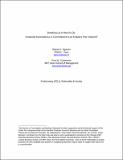Breaking up is hard to do: Irrational inconsistency in commitment to an industry peer network
Author(s)
Zuckerman Sivan, Ezra W; Sgourev, Stoyan
DownloadBreaking Up is Hard to Do Full Draft.pdf (212.5Kb)
PUBLISHER_CC
Publisher with Creative Commons License
Creative Commons Attribution
Terms of use
Metadata
Show full item recordAbstract
This paper strengthens the basis for a key claim of contemporary economic sociology — that strong ties among capitalists cannot be reduced to rational considerations. Support for this claim has been limited by reliance on an external standard of rationality, whereby irrationality in commitment to a partner or network is based on an observer’s evaluation of an actor’s interests. In this article we address this limitation by developing an internal standard for assessing the rationality of an actor’s commitment, which is derived from Davidson’s (1980) definition of akrasia or ‘incontinence.’ In addition, we clarify the mechanisms that produce ‘akratic’ commitment among capitalists: (a) short-term emotions that overwhelm rational calculation; and (b) a sense of loyalty that leads one to incorporate others’ interests into one’s own. Finally, we provide systematic evidence of akratic commitment and the proposed mechanisms from studies of an industry peer network in the remodeling construction industry.
Date issued
2011-03Department
Sloan School of ManagementJournal
Rationality and Society
Publisher
Sage Publications
Citation
Sgourev, S. V. and Zuckerman, E. W. “Breaking up Is Hard to Do: Irrational Inconsistency in Commitment to an Industry Peer Network.” Rationality and Society 23, no. 1 (February 2011): 3–34. © 2011 Sage Publications
Version: Original manuscript
ISSN
1043-4631
1461-7358